As the sun sets on UTD, healthcare freshman Rafah Shaik passes out steaming kabobs and paratas to masses of hungry students eager — but more importantly, grateful — to eat after 16 hours of fasting.
Shaik is one of hundreds of Muslim students on campus that are fasting this Ramadan, and one of many spending it for the first time away from family.
Ramadan is the ninth month in the Islamic calendar and the month Muslims believe the Quran was revealed to Prophet Muhammed. To observe this holy time of year, Muslims abstain from food and drink from sunrise to sunset and focus on strengthening their “deen” — religious participation, spirituality and service to others — through praying, reading scripture, donating and community building. The 30 days of fasting conclude with a three-day celebration known as Eid al-Fitr, the longest and most important holiday for Muslims.
Islamic months follow the lunar calendar, and as such, Ramadan moves up by about one to two weeks every year. This year, Ramadan fell smack dab in the middle of the spring semester.
“My schedule is definitely different from when Ramadan was in the summer,” Shaik said. “There’s school and homework and all of that. But that’s the beauty of it – no matter what we’re doing, we take the time to reflect and come together. It’s been unique and very rewarding.”
Suhoor
A day in Ramadan starts before the sun rises, usually around 4 or 5 a.m. To prepare for the long day of fasting, Muslims consume a breakfast meal known as suhoor in Arabic or sahari in other languages. Muslim students can eat anything as long as it is “halal,” or permissible. Foods that aren’t halal include pork, alcohol and animal products where the animal was slaughtered inhumanely.
“Some people will eat a small portion of fruits or dates and some will eat an entire meal,” Shaik said. “I usually go for something simple. Water is really important. I finish that and then go back to sleep until it’s time to get up for school.”
This year, Dining Hall West is offering suhoor power packs with the swipe of a meal card. Each pack contains a balance of fruit, bread, dates, a small entrée and a drink, and students can pick up their packs the night before suhoor.
“I’m just glad they have them,” Shaikh said. “It’s nice that they have a different type of food. They didn’t use to have this.”
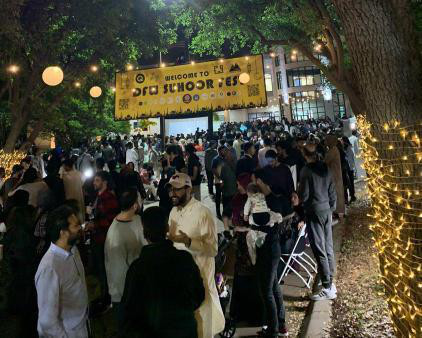
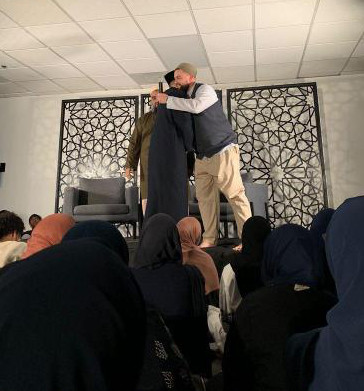
Fasting/Faith
Classes start at 10 a.m. for Shaik, and from there it’s a long day of academics and extracurriculars, all while religion is at the forefront of her mind.
“Fasting is not a burden,” Shaik said. “I’m blessed to fast, alhamdulillah. It’s like, thank God I get to fast and have this experience while doing school. And it might be more worthwhile because of the challenge during the school semester. I was sad at first to be away from my parents, who are in Minnesota, but I’m grateful to have a community to share this experience with.”
Fasting during this time of year is one of five pillars in Islam, with the other four being profession of faith (shahada), prayer (salat), donating (zakat) and making a holy pilgrimage (Hajj) to Mecca. Fasting — also known as sawm — may be the most defining practice in Ramadan, and what non-Muslims think of first when imagining the month, but Shaik said it’s equally important to focus on prayer, donating and helping the community.
“It’s definitely a time to build character and remember the people around you,” Shaik said. “It’s so easy to get absorbed in what you do every day, but you must remember those that are less fortunate than you and seek to help them, regardless of if you’re busy with classes or working. Ramadan is a reminder that I need to hold myself to a higher standard, and that holds true even when the month is over.”
Along with five daily prayers from before sunrise late into the evening, Muslims are encouraged to pray a special prayer called tarawih every night and participate in “Laylat-al-Qadr,” which translates to the “the Most Powerful Night,” the night they believe the Quran was revealed. Participation includes reading scripture and praying as many “rakats” or sessions of prayer as possible, whether that goes on for a few rounds or for the entire night.
UTD has several accommodations that Muslim students can use to practice their faith, including the Reflection Rooms in the SU, a designated prayer space with male and female congregation areas. SU bathrooms have foot wash stations for students to perform “wudu,” a cleaning and hygiene ritual that involves washing feet before praying. And as for all religions, Muslim students can request accommodations from their professors for Iftar or Eid following instructions from their school.
“No matter how rich you are, whether you’re the Saudi prince, you’re still fasting. The poor of America are still fasting,” neuroscience and philosophy sophomore Wali Mohmand said. “I think really Ramadan’s biggest essence, the biggest thing you could draw from Ramadan, is the fact that you are human and your fellow humans matter. It elevates you spiritually, but it brings you to your senses and I think that really helps build empathy for your brothers and sisters and just fellow people.”
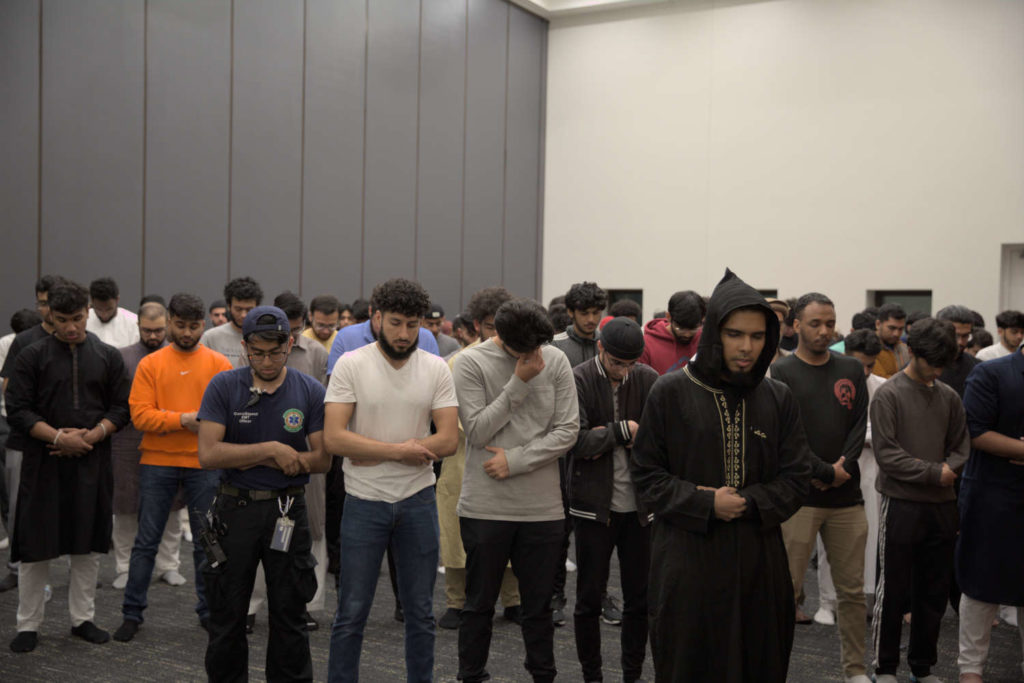
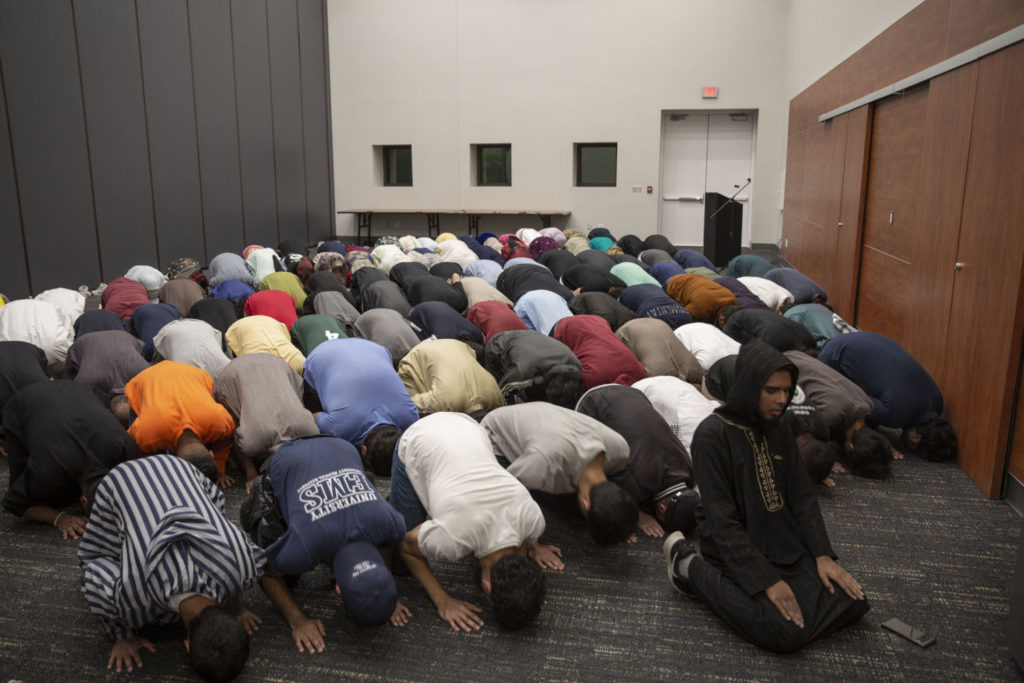
Iftar
As soon as the operatic call to prayer sounds during sunset, Shaik knows it’s time for Iftar – the meal Muslims eat to break their fast.
It’s sunnah – or blessed – to break fast with a date, so Shaik usually starts with that before heading to Muslim Student Association’s Iftar service on campus. MSA, the largest Islamic student organization on campus, offers free iftar in the Student Union every Monday to Thursday, bringing in food from restaurants such as Noodle Wave or Angel’s Chicken Kitchen.
MSA hosted a special iftar event for students on campus this past April 4 known as the Intercultural Iftar, a potluck-style dinner showcasing South Asian, Arab, and American cuisines such as steaming lamb and chicken curries, falafel and hummuses, and various pakoras – or crispy vegetable and onion fritters. Hundreds of students gathered to enjoy the late evening meal together, including Shaik who helped serve dinner to hungry fasters.
“As I mentioned before, it’s great being able to give back,” Shaik said. “The day can get tiring without food, but it’s more important to serve others first. That is the essence of fasting.”
Aside from MSA’s services, Shaik said it’s hard to find good iftar dining options at UTD and more difficult for those that don’t have a car. Halal Shack, the only Student Union dining place that offers zabiha meat, or meat slaughtered in a halal way,- extended their hours to 8 p.m. on weekdays. But most students break their fast right around then, meaning there isn’t always enough time to accommodate everyone seeking iftar in the Student Union.
In addition to Iftar dining services, MSA offers numerous programs to help Muslims feel connected to their faith. Programs include workshops and panels, donation and community service events and scripture circles that both Muslims and non-Muslims alike are welcome to attend. This year, MSA is also hosting an Eid carnival with several other Islamic organizations for Comets to celebrate with other students.
“Eid is a time for togetherness, and we didn’t want anyone to have to spend it alone,” Mohmand said. “That breaks my heart that some people might not have any family or might not be able to go back, so that’s why we put this together. We encourage any students that don’t have plans for Eid to come out. We’d love to see you there and cherish the month we spent fasting together.”
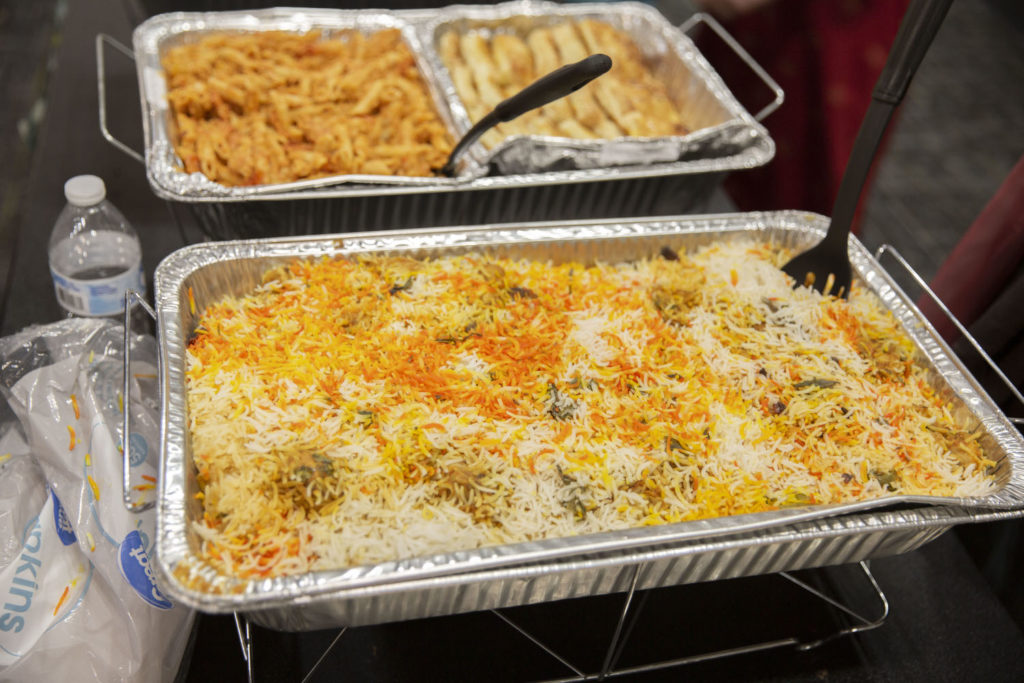
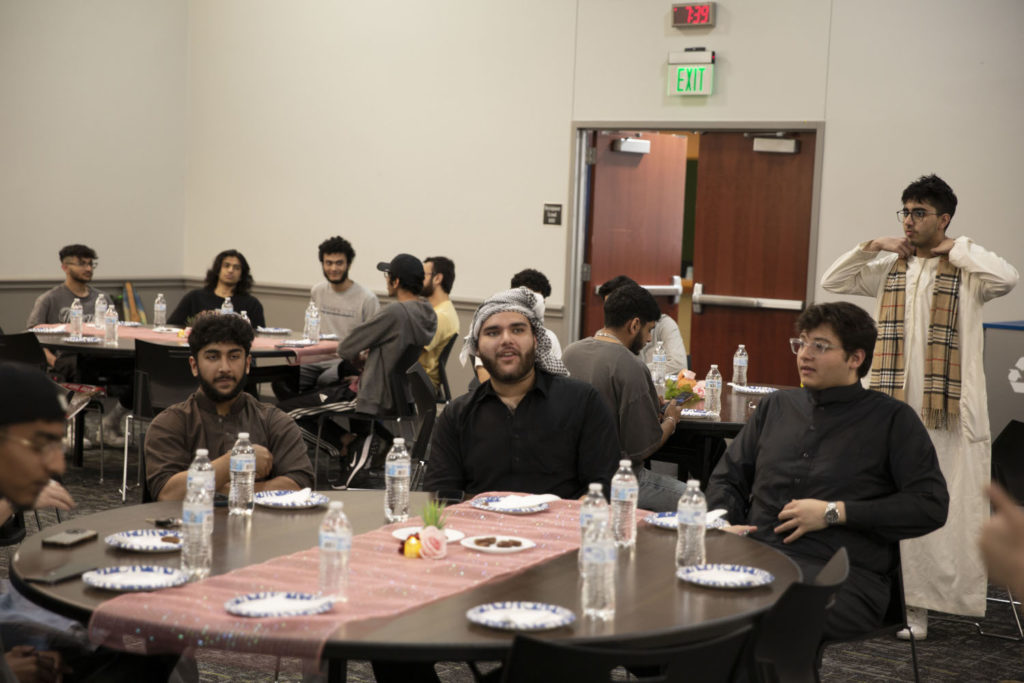
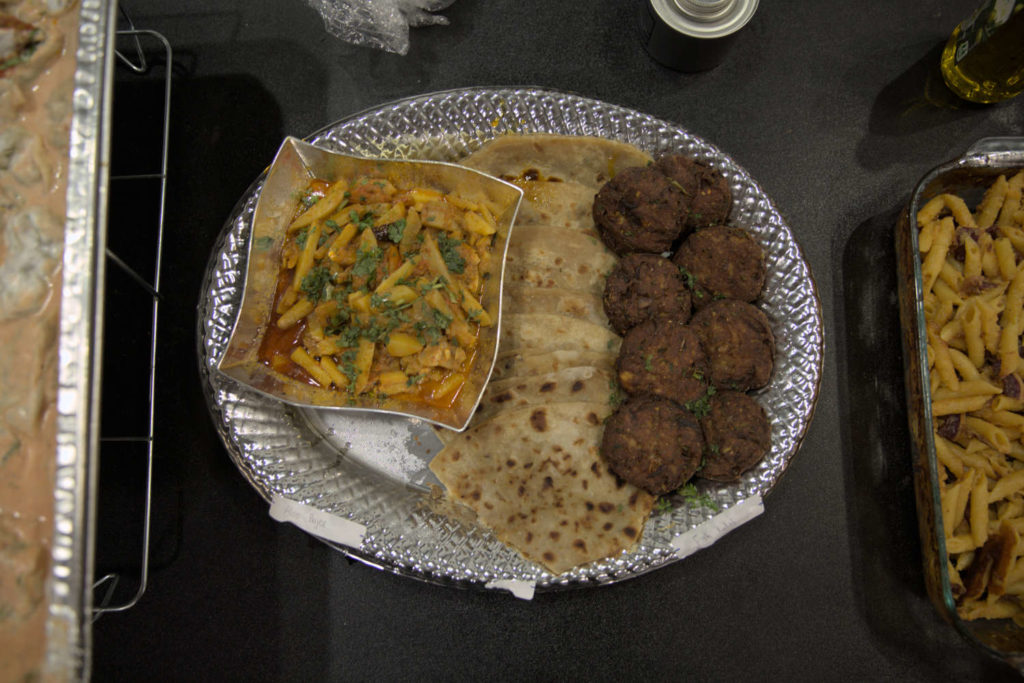
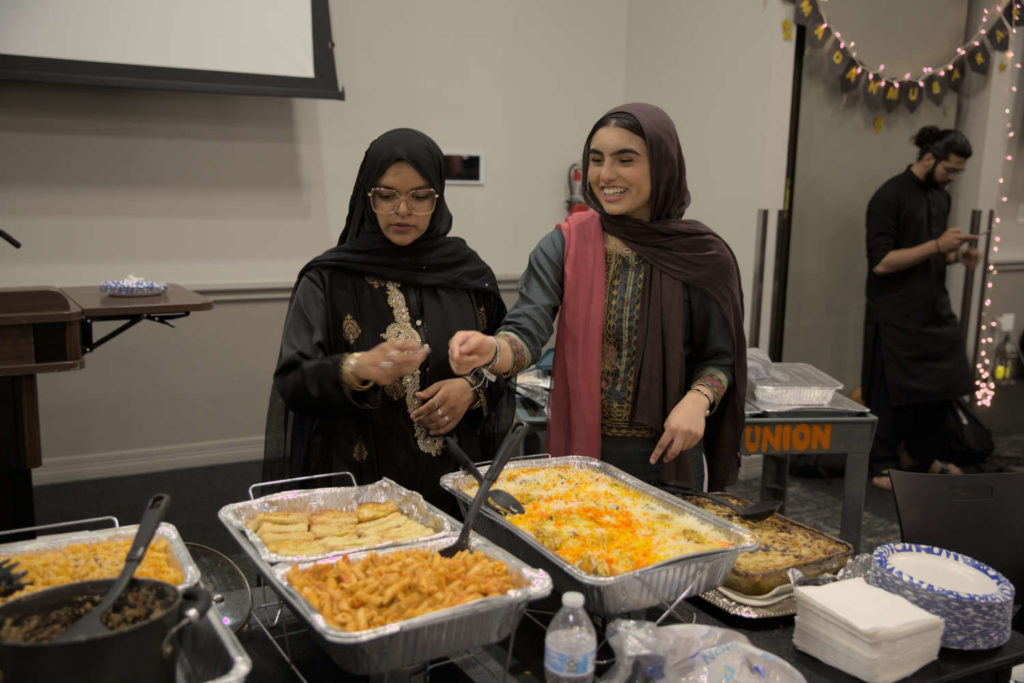
Leave a Reply